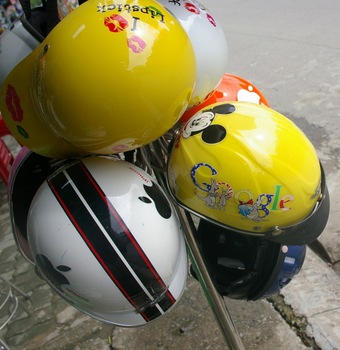We are developing the social individualist meta-context for the future. From the very serious to the extremely frivolous... lets see what is on the mind of the Samizdata people.
Samizdata, derived from Samizdat /n. - a system of clandestine publication of banned literature in the USSR [Russ.,= self-publishing house]
|
Third, there is a deeper reason for not worrying about China. China is inherently unstable. Whenever it opens its borders to the outside world, the coastal region becomes prosperous, but the vast majority of Chinese in the interior remain impoverished. This leads to tension, conflict, and instability. It also leads to economic decisions made for political reasons, resulting in inefficiency and corruption. This is not the first time that China has opened itself to foreign trade, and it will not be the last time that it becomes unstable as a result. Nor will it be the last time that a figure like Mao emerges to close the country off from the outside, equalize the wealth – or poverty – and begin the cycle anew. There are some who believe that the trends of the last thirty years will contine indefinitely. I believe the Chinese cycle will move to its next and inevitable phase in the coming decade. Far from being a challenger, China is a country the United States will be trying to bolster and hold together as a counterweight to the Russians. Current Chinese economic dynamism does not translate into long-term success.
– George Friedman of STRATFOR, getting it far righter than one of his namesakes.
Yesterday evening, I attended a discussion group at the home of Libertarian International president Christian Michel. Christian likes to invite intelligent people with a cross-section of views to these events, and although this occasionally leads to heated argument, the conversation usually remains relatively polite.
Last night, the subject of biodiversity came up, and someone made a comment about how human activity is causing every increasing extinction of species. I decided to be Devil’s Advocate to a small extent and I asked a simple question.
“Can you name any large animal that has become extinct recently?”
Nobody else in the room could successfully answer the question. One or two animals that became extinct between the seventeenth and nineteenth centuries were mentioned, as were a number of endangered but not extinct species. After they failed to provide any such animals, I mentioned one myself (the Yangtze Dolphin). For what its worth, one can find quite a few large animals that went extinct between about 1800 and 1960 due to human activity. There have been very few since 1960, however. There may be issues with how long it takes for an extinction to be officially declared, or it may be that conservation efforts are working. Or both. But it is far from incontrovertibly clear that extinctions are occurring at an unprecedented rate. There is a lot of uncertainty.
However, I was assured that there is clear evidence of extinction if I looked it up, and some such, and I was assured that it is smaller animals that are mostly becoming extinct and this is what matters. (On the other hand, if this is so, why do the tigers and other large animals get all the publicity?)
After playing the game slightly longer (“Okay, name any species of insect that has become extinct due to human activity, ever”) I backed off. However, as I was doing this, somebody made a curious comment, which was this:
“Michael, you can’t make claims like this without providing evidence”.
This was curious, as I had not made any claims. I had simply asked somebody else for evidence for what they were saying. We have been here before, oddly enough.
However, the question is a very effective one. Many people have accepted the idea that species of animal are going extinct at an alarming rate, without knowing any actual examples. Most people can at least sense the contradiction if you point it out.
Recently, I was wandering along a back street in the former Vietnamese Imperial capital of Huế, perhaps best known outside Vietnam as the site of one of the bloodier battles of the Vietnam War. This was a street full of the sort of shops that would once been have referred to as a “General Stores” in English: shops full of many goods that are likely to be useful to many people, but that sometimes seem to have a tenuous relation to one another.
In such a store, I stopped and started photographing a colourful display of western trademark violating motorcycle helmets. After I had been doing this for a short while, the shopkeeper came up to me, basically just to say hello. He didn’t mind me photographing his merchandise and was not putting any pressure on me to buy anything, but he clearly didn’t get Westerners wandering into his shop to take photographs every day. Huế is a tourist destination, but despite its easy accessibility (the Americans having built an airport) it is not nearly as big an attraction as places such as the nearby ancient town of Hoi An. One does not have to walk far from the centre of town for the presence of foreigners to be rare.
What happened next was more interesting. He gestured for his son to come over and pose for a photograph. The lad must have been only about two years old, but there was a serious amount of proud father syndrome on display. This gentleman wanted the whole world to see how proud a father he was. So they posed and I took a photo. Alas, the white balance isn’t perfect.
As an added bonus, the father decided that he would pose for the photograph with a cigarette in his mouth.
Of course, this gentleman had no idea how many western taboos he was breaking. If he had, I am sure he would have thought we were all idiots. Quite accurately.

Bangkok, Thailand. October 2010
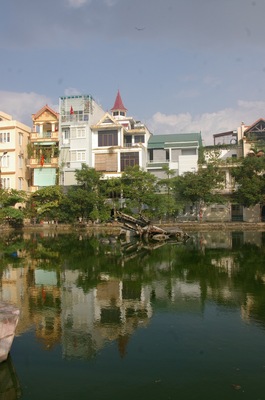 Hanoi, Vietnam. October 2010
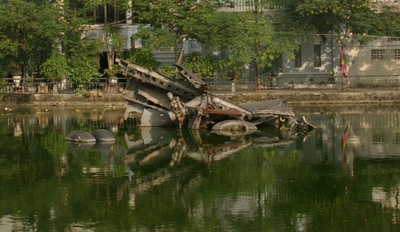
Apparently, it takes about a third of a century for the remains of a B-52 that fell into a lake after being shot down to turn into an interesting piece of municipal sculpture in a nice part of town.
Okay…
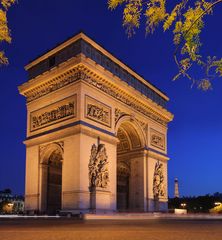 Paris Paris, France.
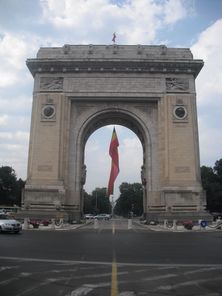
Bucharest, Romania. July 2010.
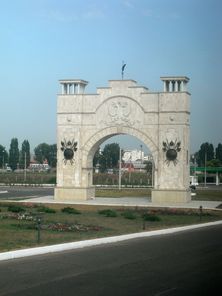
Bender, Transnistria. August 2010
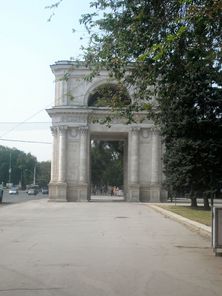
Chisinau, Modova. August 2010
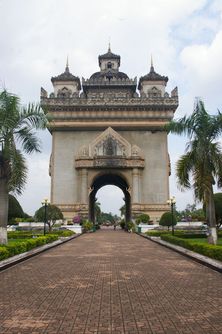
Vientiane, Laos. October 2010
I would count clubbing as not lost time too, if I had done any. I haven’t. Not even one seal.
– Guy Herbert.
I am very optimistic it will quickly become an established form of transport
– Patrick Döring, deputy chairman of the German Free Democrats, discussing the fact that long distance bus travel may be about to be legalised in Germany.
 Bucharest, Romania. August 2010.
Guests can no longer carry guns and/or ammunition on flights to or from Indonesia.
– One of the terms and conditions found in the fine print when booking a flight on the splendid Air Asia. This is, of course, an outrage.
By the way, when did “customers” or “passengers” turn into “guests”? Surely “clients” was bad enough?
 Bucharest, Romania, August 2010
The United States operates what it refers to as the Visa Waiver Program. This allows citizens of other rich countries to make short visits to the US without the hassle of obtaining a visa in advance. This follows what is pretty much standard practice: citizens of most rich countries can visit most other rich countries without obtaining a visa. In recent times the US has also required visitors to register their passport numbers with a US government website prior to coming to the US, presumably so that potential visitors can be checked against a list of prohibited visitors. This is more than most other rich countries require (although my native Australia has a very similar system) but is a very minor inconvenience.
Up until now, this whole process has been free of charge to the traveler. However, as of September 8, the US will start charging a $14 fee for people who wish to use the visa waiver program.
It is not actually terribly uncommon for governments to extort charge money from tourists in ways like this, but it is once again relatively unusual for such fees to be charged when citizens of one rich country visit another rich country. (Fees are more common when citizens of rich countries visit poor countries or vice versa). As a frequent traveler, however, I find such fees loathsome. Having a moneygrubbing government steal money from you is not a good first impression of a country. Such policies do of course influence where I choose to travel to, and whether I will return to a country for multiple visits.
What does boggle the mind about the new US policy is its justification. The fee has been introduced under something called the Travel Promotion Act of 2009, which was passed with overwhelming support in both houses of Congress. Apparently, the money is to be used to set up something called the Corporation for Travel Promotion, which will apparently “promote America to overseas tourists”, and thus halt the decline in tourism to the US.
Got that? A tax is to be imposed on tourists, the proceeds of which will be used to set up a new bureaucracy to promote US tourism to foreigners, who will then come in greater numbers.
Brilliant.
|
Who Are We? The Samizdata people are a bunch of sinister and heavily armed globalist illuminati who seek to infect the entire world with the values of personal liberty and several property. Amongst our many crimes is a sense of humour and the intermittent use of British spelling.
We are also a varied group made up of social individualists, classical liberals, whigs, libertarians, extropians, futurists, ‘Porcupines’, Karl Popper fetishists, recovering neo-conservatives, crazed Ayn Rand worshipers, over-caffeinated Virginia Postrel devotees, witty Frédéric Bastiat wannabes, cypherpunks, minarchists, kritarchists and wild-eyed anarcho-capitalists from Britain, North America, Australia and Europe.
|
